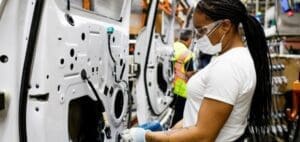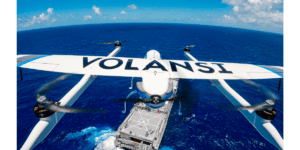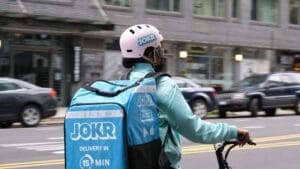 For the US Women’s National Soccer Team, the 2020 Tokyo Olympics were supposed to be another Gold Medal event, as it entered with a 44-match unbeaten streak. That streak came to an end in its first match, a 3-0 loss to Sweden, which happened to be the last team to defeat the US. And while the team still advanced to the knockout stage, its run ended with a hard-fought bronze medal victory over Australia. In that match, two team USA icons cemented their legacies, in what could be their swan song, at least for the Olympics. Megan Rapinoe and Carli Lloyd both scored two goals in the bronze medal game. For the latter, the two goals made Lloyd the all-time leading scorer for the US in the Olympics with 10 goals. She also became the first US player to score a goal in four different Olympics. Congrats to Carli Lloyd, one of the greatest to ever wear the US uniform. And now on to this week’s logistics news.
For the US Women’s National Soccer Team, the 2020 Tokyo Olympics were supposed to be another Gold Medal event, as it entered with a 44-match unbeaten streak. That streak came to an end in its first match, a 3-0 loss to Sweden, which happened to be the last team to defeat the US. And while the team still advanced to the knockout stage, its run ended with a hard-fought bronze medal victory over Australia. In that match, two team USA icons cemented their legacies, in what could be their swan song, at least for the Olympics. Megan Rapinoe and Carli Lloyd both scored two goals in the bronze medal game. For the latter, the two goals made Lloyd the all-time leading scorer for the US in the Olympics with 10 goals. She also became the first US player to score a goal in four different Olympics. Congrats to Carli Lloyd, one of the greatest to ever wear the US uniform. And now on to this week’s logistics news.
- Ford shifts focus to built-to-order to mitigate semiconductor shortage’s effects
- Another shipping crisis strikes, threatens Black Friday shopping
- Volansi completes first-ever autonomous ship-to-ship drone delivery
- Pet food shortages leave owners on the hunt for kibble and cat treats
- 15-minute grocery delivery services are trying to compete with Amazon and DoorDash
- Amazon’s Whole Foods to add delivery charges
- Varda Space Industries secures $42m for off-planet manufacturing
- FDA grants industry 30-day extension to comment on track and trace guidance
 As Steve Banker wrote about in last week’s news roundup, the worldwide shortage of semiconductors is expected to last through the first quarter of 2023 at a minimum according to the electronics supply chain analysis firm Supplyframe. As a result, Ford is revamping its supply chain operations to focus on “built-to-order” vehicles. Executives said the company’s shift to a build-to-order emphasis will result in fewer vehicles on dealership lots but will provide Ford with better demand visibility as the supply of semiconductors remains constrained. In comparison, Tesla is substituting alternative chips and writing new firmware to work its way around the chip shortage. As Ford sees it, engaging directly with semiconductor fabricators and other key electronic-components makers in its supply chain allow the company “to better align supply and demand.”
As Steve Banker wrote about in last week’s news roundup, the worldwide shortage of semiconductors is expected to last through the first quarter of 2023 at a minimum according to the electronics supply chain analysis firm Supplyframe. As a result, Ford is revamping its supply chain operations to focus on “built-to-order” vehicles. Executives said the company’s shift to a build-to-order emphasis will result in fewer vehicles on dealership lots but will provide Ford with better demand visibility as the supply of semiconductors remains constrained. In comparison, Tesla is substituting alternative chips and writing new firmware to work its way around the chip shortage. As Ford sees it, engaging directly with semiconductor fabricators and other key electronic-components makers in its supply chain allow the company “to better align supply and demand.”
Delays in manufacturing and distribution can have a ripple effect that can cause larger delays further down the supply chain. The strain that has been impacting global supply chains over the last year was dealt another blow with flooding in Europe and China. As a result, the 2021 holiday shopping season could be marred by out-of-stock goods and shipping delays. The disasters have damaged railways used for the delivery of goods and raw materials in both regions. Water rushed into industrial areas extensively damaging facilities, machinery, and warehouses.
 Volansi, a leading company in autonomous, point-to-point deliveries using fixed-wing Vertical Take-off and Landing (VTOL) drones, announced a major milestone: it completed the first-ever autonomous drone delivery between two ships. The cargo deliveries took place July 18 off the coast of Key West, Florida. Both its VOLY 10 and VOLY 20 series of drones were involved, with two flights covering 15 nautical miles and one flight covering one nautical mile. Volansi says this is the first time ever that an autonomous drone has carried out such missions, carrying cargo between two moving US government vessels.
Volansi, a leading company in autonomous, point-to-point deliveries using fixed-wing Vertical Take-off and Landing (VTOL) drones, announced a major milestone: it completed the first-ever autonomous drone delivery between two ships. The cargo deliveries took place July 18 off the coast of Key West, Florida. Both its VOLY 10 and VOLY 20 series of drones were involved, with two flights covering 15 nautical miles and one flight covering one nautical mile. Volansi says this is the first time ever that an autonomous drone has carried out such missions, carrying cargo between two moving US government vessels.
North American pet owners are struggling to track down certain foods from major retailers like Amazon, Target, and PetSmart as the sector grapples with increased demand and strains on the supply chain. Costs for pet food ingredients have climbed 8 percent to 20 percent since the pandemic began. Exacerbating the problem is the fact that there are more pet owners now than when the pandemic began, putting added strain on an already strained supply chain. Amazon said pet food manufacturers are prioritizing top-selling items over niche products because of increased demand.
 Grocery delivery blew up during the great lockdown of 2020 and shows no signs of slowing down. And much like any e-commerce model, the goal is to get items to consumers as fast as possible. Whether it is crowdsourced deliveries or private branded vans, customers are looking for fast and free service. In recent months, several 15-minute or less grocery delivery services have launched in American cities. These startups include Fridge No More, Gorillas, Jokr, and 1520. To execute the concept, rapid, hyper-local delivery calls for centrally located ghost shops and employing in-house warehouse and delivery employees. Much of the ultra-fast-delivery’s execution relies on streamlined logistics, which is a combination of centrally located cloud stores and software. These new companies are putting more pressure on retail giants such as Amazon, Walmart, and Target.
Grocery delivery blew up during the great lockdown of 2020 and shows no signs of slowing down. And much like any e-commerce model, the goal is to get items to consumers as fast as possible. Whether it is crowdsourced deliveries or private branded vans, customers are looking for fast and free service. In recent months, several 15-minute or less grocery delivery services have launched in American cities. These startups include Fridge No More, Gorillas, Jokr, and 1520. To execute the concept, rapid, hyper-local delivery calls for centrally located ghost shops and employing in-house warehouse and delivery employees. Much of the ultra-fast-delivery’s execution relies on streamlined logistics, which is a combination of centrally located cloud stores and software. These new companies are putting more pressure on retail giants such as Amazon, Walmart, and Target.
Speaking of Amazon’s home grocery delivery service, the company is tacking on a delivery fee for Prime members who shop at Whole Foods Markets in several US cities. This is seen as proof that the economics behind grocery delivery are a challenge for even the largest of companies. Shoppers were informed of a $9.95 service fee for deliveries beginning August 30 in the Boston and Chicago areas, as well as Manchester, New Hampshire, Portland, Maine, and Providence, Rhode Island. According to Amazon, the service fee “helps to cover operating costs, so we can continue to offer the same competitive everyday prices in-store and online at Whole Foods Market.” Given the general feeling around Amazon, this is sure to raise some eyebrows.
 Space exploration has become a bit blasé over the last few months as more and more billionaires seek to launch themselves into space. But not all space exploration efforts are created equally. Varda Space Industries has raised a $42 million Series A to bring to manufacturing a key capability that can only be found off-world: microgravity. The company’s co-founders, SpaceX veteran Will Bruey and Founders Fund principal Delian Asparouhov, want to open up manufacturing processes that aren’t possible on Earth in order to make bio-printed organs, fiber-optic cables, or pharmaceuticals. These are products that require fundamentally different conditions than what’s available on-planet. The eight-month-old startup is looking to establish its first manufacturing facility in space as early as 2023, and by doing so, bring back to Earth advanced products that can only be made under sustained periods of zero gravity.
Space exploration has become a bit blasé over the last few months as more and more billionaires seek to launch themselves into space. But not all space exploration efforts are created equally. Varda Space Industries has raised a $42 million Series A to bring to manufacturing a key capability that can only be found off-world: microgravity. The company’s co-founders, SpaceX veteran Will Bruey and Founders Fund principal Delian Asparouhov, want to open up manufacturing processes that aren’t possible on Earth in order to make bio-printed organs, fiber-optic cables, or pharmaceuticals. These are products that require fundamentally different conditions than what’s available on-planet. The eight-month-old startup is looking to establish its first manufacturing facility in space as early as 2023, and by doing so, bring back to Earth advanced products that can only be made under sustained periods of zero gravity.
The US Food and Drug Administration (FDA) has agreed to give the pharmaceutical industry more time to comment on a draft guidance calling for the establishment of electronic systems to track products through the supply chain. Prior to Monday’s announcement of the extension, two groups representing pharmaceutical manufacturers, wholesalers, and distributors had requested the delay to allow more time for industry to review draft guidance calling for the establishment of electronic systems for tracking products through the supply chain. An industry consortium has stepped in to help guide efforts in setting up these electronic systems. In July the Partnership for DSCSA Governance (PDG), comprising 60 pharmaceutical supply chain members, developed a blueprint for tracking systems.
That’s all for this week. Enjoy the weekend and the song of the week, Scandal’s the Warrior.

















